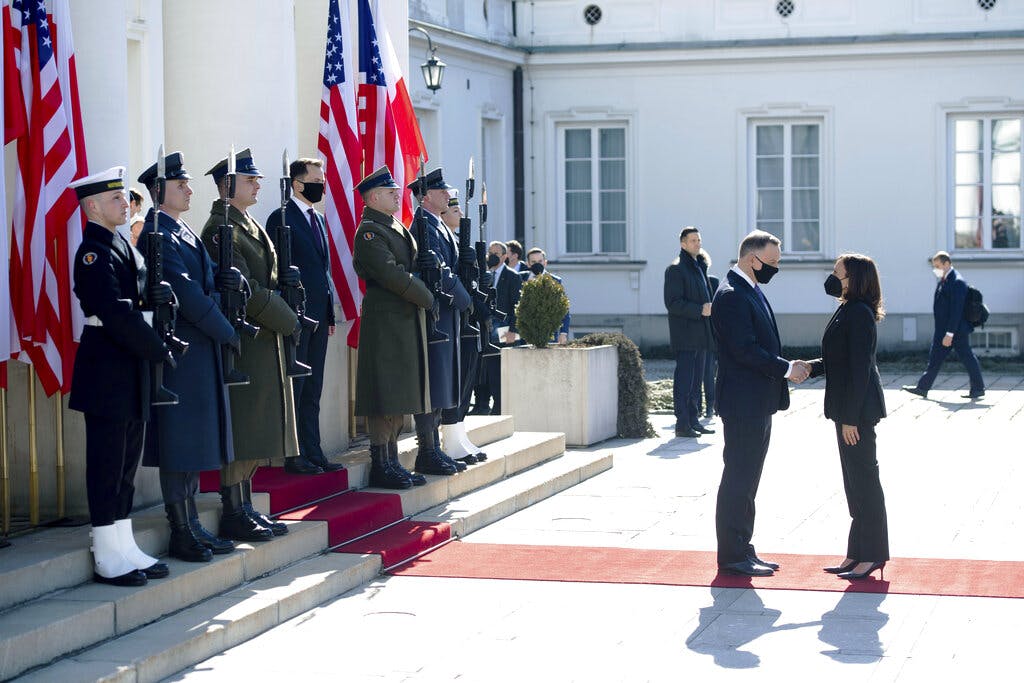Russia War Crimes Probe Sought
Duda said it is ‘obvious to us that in Ukraine Russians are committing war crimes.’ He added that in his view the invasion was ‘bearing the features of a genocide.’

ATHENS — In Warsaw today, Vice President Harris embraced calls for an international war crimes investigation of Russia over its invasion of Ukraine and the bombing of civilians.
The Russian bombardment of a maternity hospital at the Black Sea port city Mariupol yesterday left three dead and several more injured, sparking international furor.
Speaking at a press conference alongside the Polish president, Andrzej Duda, Mrs. Harris expressed outrage over the bombing Wednesday of the maternity hospital and the scenes of bloodied pregnant women being evacuated, as well as other attacks on civilians. She stopped short, however, of directly accusing Russia of having committed war crimes.
“Absolutely there should be an investigation, and we should all be watching,” Mrs. Harris said, according to the Associated Press, noting that the United Nations has already started a process to review allegations. “I have no question the eyes of the world are on this war and what Russia has done in terms of this aggression and these atrocities.”
Mr. Duda was more unflinching in his criticism, saying it is “obvious to us that in Ukraine Russians are committing war crimes.” He added that in his view the invasion was “bearing the features of a genocide — it aims at eliminating and destroying a nation.”
Poland shares an extensive eastern border with Ukraine, a country with which it also has some common history — Lviv, for example, was a Polish city long before it was Ukrainian. That city has also been on the frontlines of Europe’s biggest intracontinental influx of refugees since World War II. The Daily Mail reports that 200,000 refugees have streamed into Lviv, many on their way to Poland about 43 miles west.
Mrs. Harris praised the Polish people for their generosity for taking in nearly 1.5 million refugees since Russia invaded Ukraine last month.
“I’ve been watching or reading about the work of ordinary people doing extraordinary things, and so I bring you thanks from the American people,” Mrs. Harris said earlier during a meeting with the Polish prime minister, Mateusz Morawiecki. That was hours after the U.S. House passed a spending bill that includes $13.6 billion in aid for Ukraine and its European allies.
The legislation includes $6.8 billion to care for refugees and other economic aid to allies.
Mrs. Harris’s whirlwind visit to Poland and Romania was billed by the White House as a chance for the vice president to consult with two of the leaders from eastern flank NATO nations about the growing humanitarian crisis caused by the Russian invasion of Ukraine, the AP reported.
Already, more than 2 million refugees have fled Ukraine — with more than half coming to Poland — and even more are expected to arrive in the days ahead.
Mr. Duda, for his part, warned of a “refugee disaster” if Poland doesn’t receive more assistance to help house and feed Ukrainians fleeing the conflict. He said he asked Mrs. Harris for America to “speed up” the process for those Ukrainian refugees who would want to go to the U.S. and might have family there.
The war in Ukraine has thrust Poland into the international spotlight, unexpectedly raising Mr. Duda’s profile in the process. His political track record has not been without controversy: Last year he signed a controversial law to restrict reparations for Holocaust victims, an act that resulted in Israel recalling its top diplomat from Warsaw. Israel’s foreign minister, Yair Lapid, called Poland an “anti-democratic and illiberal country that does not honor the greatest tragedy in human history.”
It is no overstatement to say that Polish diplomacy could use a little polish.
Differences between Warsaw and Washington over a Polish plan to send Soviet-made fighter jets to a base in Germany for Ukraine’s use have cast a shadow over Mrs. Harris’s visit to Poland. Just as she arrived in Warsaw late Wednesday evening, the Pentagon definitively rejected the idea.
The proposal was publicly floated by Poland — without first consulting the U.S. — days after Secretary of State Blinken said the Biden administration was “very, very actively” looking at a proposal under which Poland would supply Kiev with Soviet-era fighters and in turn receive American F-16s to make up for their loss.
On Wednesday, the Pentagon shut the door on the prospect of NATO transferring jets to Ukraine, saying such a move with a U.S. and NATO connection would run a “high risk” of escalating the Russia-Ukraine war.
General Tod D. Wolters, the commander of U.S. European Command, said in a statement Thursday that the “most effective way to support the Ukrainian military in their fight against Russia is to provide increased amounts of anti-tank weapons and air defense systems.” That effort by the U.S. and allies is ongoing, General Wolters added.
